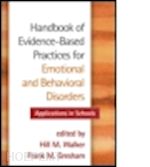Prologue: On Following the Scientific Evidence, James M. Kauffman I. Foundations 1. Evaluating the Evidence Base for Emotional and Behavioral Disorders in Schools, Frank M. Gresham and Hill M. Walker 2. Empirically Supported School-Based Mental Health Programs Targeting Academic and Mental Health Functioning: An Update, Hilary B. Vidair, Danielle Sauro, Jacquelyn B. Blocher, Laura A. Scudellari, and Kimberly Eaton Hoagwood 3. Multicultural Issues for Schools and Students with Emotional and Behavioral Disorders: Disproportionality in Discipline and Special Education, Russell J. Skiba, Laura V. Middelberg, and Maryellen Brunson McClain 4. Legislation, Regulation, Litigation, and the Delivery of Support Services to Students with Emotional and Behavioral Disorders in School Settings, Mitchell L. Yell, Shelley Neilsen Gatti, and R. Allan Allday 5. Longitudinal Outcomes and PostHigh School Status of Students with Emotional and Behavioral Disorders, Mary Wagner 6. The Interface between Child Psychiatry and Special Education in the Treatment of Students with Emotional and Behavioral Disorders in School Settings, Richard E. Mattison II. Screening, Performance Monitoring, and Assessment 7. Screening and Identification Approaches for Detecting Students at Risk, Kathleen Lynne Lane, Wendy Peia Oakes, Holly Mariah Menzies, and Kathryn A. Germer 8. Social Skills Assessment and Training in Emotional and Behavioral Disorders, Frank M. Gresham and Stephen N. Elliott 9. Progress Monitoring Methods and Tools for Academic Performance, Mark R. Shinn 10. Behavioral Universal Screening and Progress Monitoring with Web-Based Technology, Brion Marquez, Pamela Yeaton, and Claudia Vincent 11. Systematic Progress Monitoring of Students with Emotional and Behavioral Disorders: The Promise of Change-Sensitive Brief Behavior Rating Scales, Clayton R. Cook, Robert J. Volpe, and John Delport 12. Strength-Based Assessment Issues, Tools, and Practices in School-Related Contexts and Schools in the United States and Finland, Regina M. Oliver, Cynthia J. Cress, and Hannu Savolainen, and Michael H. Epstein 13. Conducting Functional Behavior Assessments for Students with Emotional/Behavioral Disorders, Brian K. Martens and Tonya L. Lambert III. Interventions Targeting Specific Disorders and Settings 14. Applying Positive Behavior Interventions and Supports in Alternative Education Programs and Secure Juvenile Facilities, Jeffrey R. Sprague, Kristine Jolivette, and C. Michael Nelson 15. Bullying and Aggression in School Settings, Stephen S. Leff, Christine Waanders, Tracy Evian Waasdorp, and Brooke S. Paskewich 16. Interventions for Students with Attention-Deficit/ Hyperactivity Disorder: School and Home Contexts, George J. DuPaul, Seth D. Laracy, and Matthew J. Gormley 17. Empirically Based Targeted Prevention Approaches for Addressing Externalizing and Internalizing Behavior Disorders within School Contexts, John R. Seeley, Herbert H. Severson, and Amanda A. M. Fixsen 18. Evidence-Based Intervention Approaches for Students with Anxiety and Related Disorders, Anna J. Swan, Colleen M. Cummings, Nicole E. Caporino, and Philip C. Kendall 19. Secondary Education and Promising Practices for Students with Emotional/Behavioral Disorders, Douglas A. Cheney, Therese M. Cumming, and Tal Slemrod IV. Generic Intervention Approaches 20. Addressing the Academic Problems and Challenges of Students with Emotional and Behavioral Disorders, J. Ron Nelson, Gregory J. Benner, and Janet Bohaty 21. School-Based Wraparound for Adolescents: The RENEW Model for Transition-Age Youth with or at Risk Emotional and Behavioral Disorders, Lucille Eber, JoAnne M. Malloy, Jennifer Rose, and Ami Flamini 22. The Role of School Mental Health Models in Preventing and Addressing Childrens Emotional and Behavioral Problems, Steven W. Evans, Tiffany Rybak, Holly Strickland, and Julie Sarno Owens 23. Improving Transition Outcomes for Students with Emotional and Behavioral Disorders, Deanne K. Unruh and Christopher J. Murray 24. Improving Engagement and Implementation of Interventions for Children with Emotional and Behavioral Disorders in Home and School Settings, Wendy M. Reinke, Andy J. Frey, Keith C. Herman, and Charlos V. Thompson 25. Treatment Integrity within a Three-Tiered Model, Frank M. Gresham 26. Issues and Criteria for the Effective Use of Psychopharmacological Interventions in Schooling, Dean E. Konopasek and Steven R. Forness V. Early Intervention 27. Evidence-Based Practices for Infants and Toddlers with Autism Spectrum Disorders, Phillip S. Strain, Erin E. Barton, and Edward H. Bovey 28. Supportive Interventions for Young Children with Social, Emotional, and Behavioral Delays and Disorders, Glen Dunlap and Lise Fox 29. The Evidence Base of the First Step to Success Early Intervention for Preventing Emerging Antisocial Behavior Patterns, Hill M. Walker, Herbert H. Severson, John R. Seeley, Edward G. Feil, Jason Small, Annemieke M. Golly, Andy J. Frey, Jon Lee, W. Carl Sumi, Michelle Woodbridge, Mary Wagner, and Steven R. Forness VI. Research Methods 30. Qualitative and Mixed Design Research in Emotional and Behavioral Disorders, Edward J. Sabornie, and Stacy L. Weiss 31. The Role of Research in Evaluation of Interventions for School-Related Behavioral Disorders, Keith Smolkowski, Lisa Strycker, and John R. Seeley 32. Establishing an Evidence Base: Lessons Learned from Implementing Randomized Controlled Trials for Behavioral and Pharmacological Interventions, Steven R. Forness, Hill M. Walker, and Loretta A. Serna Epilogue: Science, a Harsh Mistress, James M. Kauffman











